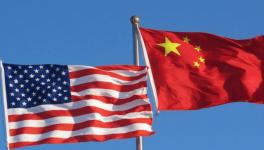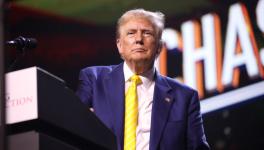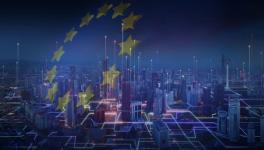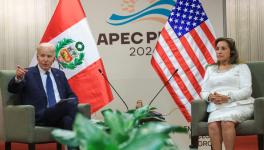Data is the New Oil, So Big Tech is Pushing for A Digital Free Trade Deal

Image Courtesy: Hoang Dinh Nam / AFP / Getty Images
Now that Big Tech has become the dominant force in the global economy, it is taking on another role once played by the corporate giants it has usurped: pushing for a new round of global economic liberalization, this time focused on data.
The push comes as the tech industry faces resistance: pesky local regulators, increasing government scrutiny, and nations across the world waking up to the reality that data is the new oil — and they gave away their digital oil reserves to a few giant American and Chinese companies without even noticing.
In the European Union, antitrust legislation and strong privacy protection are on the rise, and political leaders are questioning tech’s exploitative business models, which often extract personal data, sidestep labor laws and automate jobs. The industry is facing investigations and congressional hearings in dozens of jurisdictions, including the United States.
Such threats can be neutralized, or at least kept in check, by pushing for a liberalization of the digital economy in the same way previously rounds of free trade talks liberalized the physical economy, limiting the ability of national governments to regulate, protect local industries and oversee multinationals. In so many areas that define our daily lives — things like artificial intelligence, algorithm transparency, platform neutrality, and digital security and safety standards — digital free trade rules could tie the hands of national governments looking to oversee their online economies.
These rules are being discussed in rooms where the public interest has no seat at the table. This week, at a WTO Ministerial Summit in Argentina, the host and a group of major developed and developing countries aligned with Big Tech’s vision attempted to push the data liberalization agenda forward.
However, they faced pushback, particularly from India and the WTO’s African group, which said in an October statement that the proposed new rules “would entrench existing imbalances and further constrain the ability of our governments to implement industrial policy and catch-up.”
The Buenos Aires meeting ended on Wednesday evening with no outcome — not even a Ministerial Declaration — which perhaps isn’t surprising, given the Trump administration’s skepticism toward multilateral trade deals. But 70 countries, led by the EU, Japan and Australia and including Russia, China and ten Latin American states, committed to begin work on future negotiations on trade-related aspects of e-commerce. Meetings could begin in early 2018.
The statement will be celebrated and promoted by the interest groups seeking data liberalization, because support from such powerful block could have global implications sooner than we think.
One thing that makes this new push notable is the role of China, whose position in the global economy — and the digital economy in particular — is dramatically different to where it was decades ago when much of the trade agenda was first negotiated. China is a digital giant, and has been one of the most enthusiastic WTO member states in pushing for discussions on digital trade liberalization. Both the Chinese private sector and government are eager to pursue these talks at the WTO, as they move fast and aggressively in the Asia-Pacific region, consolidating strategic control of digital platforms and data.
China’s Alibaba is now the world’s largest retailer, surpassing Walmart in 2016, and has launched the first pilot of a Digital Free Trade Zone in Malaysia, in a new architecture for public-private partnership between a tech giant and a government. Alibaba CEO Jack Ma was at the ministerial meeting in Argentina this week, announcing alongside WTO Director-General Roberto Azevêdo a partnership aiming to “begin a high-level conversation on e-commerce policies and practices that can benefit small businesses.”
China’s tech industry has nothing to envy in other tech giants, and in many ways it enjoys even less regulatory restrictions than competitors in the West. Chinese tech companies can opportunistically using the country’s “developing country” status in arenas such as the WTO, while in reality they are outpacing almost any digital business from wealthy economies economies like Australia, the EU, and Japan.
If WTO talks on data liberalization begin, US tech giants will use a legitimate criticism — that China has used it’s “Great Firewall” and strict government control to protect and incubate local giants and unfairly harm overseas competitors — to justify pushing their agenda. That agenda is likely to involve complete data liberalization, tougher rules on the transfer of technology, and even tighter trade secret rules – all of which would disadvantage the global poor.
While these demands pushed by the US and others may be framed as necessary to neutralize emerging Chinese tech giants, they would also make it practically impossible for consumer organizations, researchers and authorities to scrutinize the algorithms running basic services, putting citizens in an even weaker spot than they are today.
At the core of the tensions is the flow of data, which threatens to even further widen global inequality. “The more data you have, the better the data products you can develop,” Professor Steven Weber said when discussing the link between data and development. “The better the data products you develop and sell, the more data you receive as those products get used more frequently and by larger populations.”
But if all the world’s data flows back to a few tech powerhouses, without restrictions or taxes, this will further reinforce their monopolies, widen the privacy gap, and leave developing countries as passive consumers or data points, rather than participants in the digital economy.
Those calling for liberalization use the rhetoric of creating opportunities for the poor — connecting the next billion — which sounds great, but only if we disconnect it from reality. Today, 60% world lacks even access to electricity. In the past, Spanish colonizers arrived in the Americas offering mirrors to the indigenous people in exchange for their gold. Is connectivity the “mirror” powerful actors are offering to the global poor today?
Trade agreements eliminate the diversity of domestic policies and priorities, and impose costly restrictions on countries that want to address local inequalities and boost local industry. In the case of the digital economy, it will consolidate the position of few, to the detriment of the rest.
Disclaimer: The views expressed here are the author's personal views, and do not necessarily represent the views of Newsclick.
Get the latest reports & analysis with people's perspective on Protests, movements & deep analytical videos, discussions of the current affairs in your Telegram app. Subscribe to NewsClick's Telegram channel & get Real-Time updates on stories, as they get published on our website.























